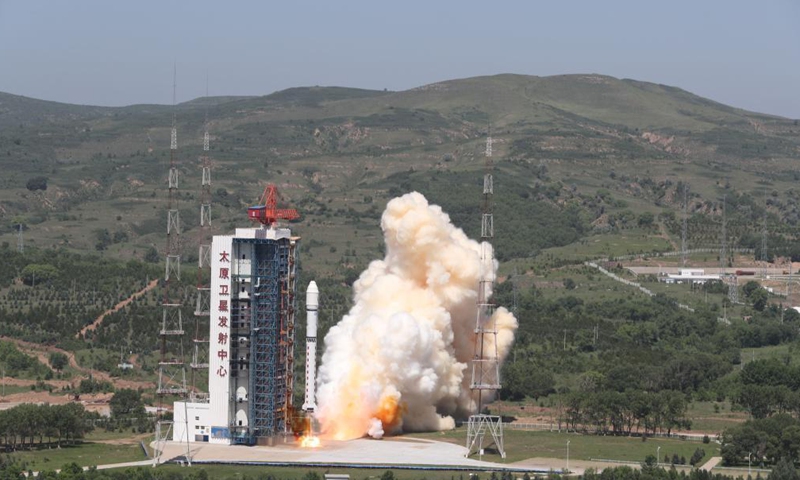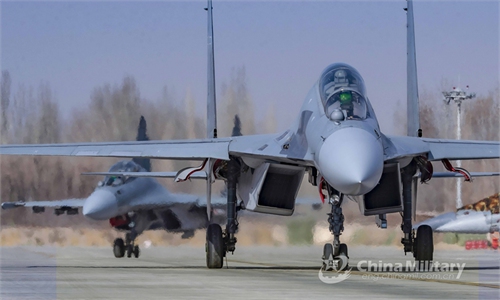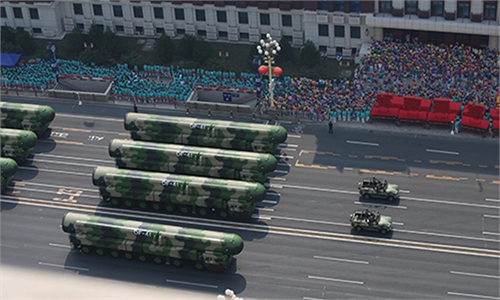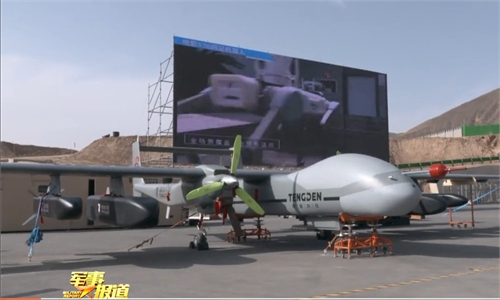Pentagon’s ‘China, Russia threat in space’ hype aims at hegemony, developing own military: FM

A Long March-2D rocket carrying the satellite Jilin-1 01B blasts off from the Taiyuan Satellite Launch Center in north China's Shanxi Province, July 3, 2021. This was the 376th flight mission of the Long March rocket series, the launch center said.Photo:Xinhua
By disregarding facts and repeatedly hyping the "space threat from China and Russia," the US is creating excuses to develop its own military and seek hegemony in space, the Chinese Foreign Ministry said on Wednesday, after the Pentagon's intelligence agency claimed on Tuesday that China and Russia are developing and deploying weapons that can stop US satellites while also increasing its own fleet of intelligence, surveillance and reconnaissance (ISR) space vehicles.It is also a reflection of the US' Cold War mentality and a right-wing move to shift responsibility, as it is the US that is the biggest threat to space security, Zhao Lijian, a spokesperson at China's Ministry of Foreign Affairs, told the Global Times at a regular press conference on Wednesday.
The US government openly designated outer space as a combat zone, pushed for the establishment of the Space Force and Space Command, and put heavy efforts in the development and deployment of offensive outer space weapons, Zhao said.
As a country that owns more than a thousand satellites, the US is still launching all kinds of satellites including military reconnaissance ones. The US military also participated in many commercial space investments and procured commercial satellite services worth billions of dollars for military purposes, Zhao pointed out, noting that the US has also become the biggest obstacle to the outer space arms control process by constantly rejecting negotiations over related legal documents.
Zhao's remarks come after the US Defense Intelligence Agency claimed in a report on Tuesday that China has multiple ground-based laser weapons of varying power levels to disrupt, degrade, or damage satellites that include a current limited capability to employ laser systems against satellite sensors, and by the mid- to late-2020s, China may field higher power systems that extend the threat to the structures of non-optical satellites, Bloomberg reported on Wednesday.
The report also accused China of expanding its own fleet of ISR satellites, and as of January, it included more than 250 systems, "second only to the US nearly doubling China's in-orbit systems since 2018."
It also said the Chinese People's Liberation Army (PLA) "owns and operates about half of the world's ISR systems, most of which could support monitoring, tracking and targeting of US and allied forces worldwide, especially throughout the Indo-Pacific region. These satellites also allow the PLA to monitor potential regional flashpoints, including the Korean Peninsula, Taiwan, Indian Ocean and South China Sea."
In response, Zhao said that China always advocates the peaceful use of outer space, opposes the weaponization of and an arms race in outer space, and actively promotes the building of a community with a shared future for mankind in space, and China's space exploration aims to fulfill the needs of the country's economy, society, technology and prosperity.
The US should stop hyping the "China threat in space" theory, stop obstructing negotiations on legal documentation on outer space arms control, and should help safeguard peace and security in space, Zhao urged.
The US is like a thief posing as a judge by accusing China of being a threat in space, as the US is the one that leads in militarizing and weaponizing space and aims to achieve space hegemony, Huang Zhicheng, a senior expert on aerospace science and technology, told the Global Times on Wednesday.
Not only did the US start to deploy a large number of military satellites back in the Gulf War, the Kosovo War, the Iraq War and the War in Afghanistan, it is also the first country in the world to develop anti-satellite weapons, including anti-satellite experiments in 1984 and 1985 using F-15 fighter jets, and the anti-satellite test with a Standard-3 missile in 2008, Huang said, noting that the US also developed equipment that can disrupt communications satellites, and it also conducted several tests with the X-37B spacecraft which has military applications.
While China has made tremendous achievements in space exploration in recent years, China always advocates the peaceful use of space and firmly opposes militarization and weaponization, Huang stressed.
China needs to ensure the safety of its space properties and develop the means to safeguard China's space security, Huang said. For example, in a very dangerous move, Starlink satellites of the US' SpaceX approached China's space station twice in 2021, forcing the latter to take active evasive maneuvers.




